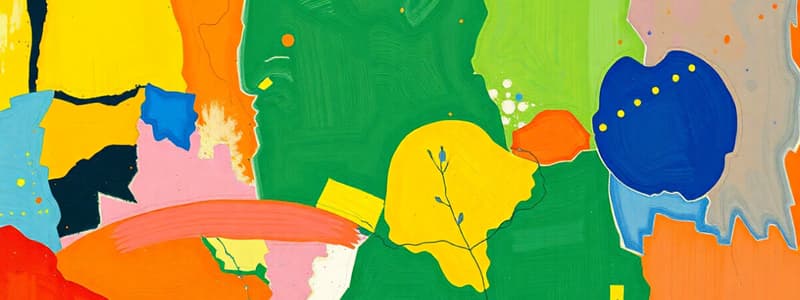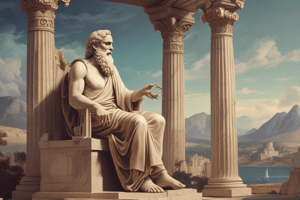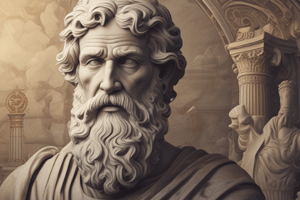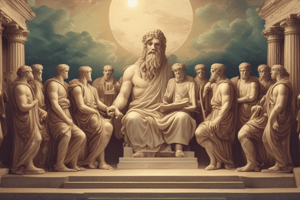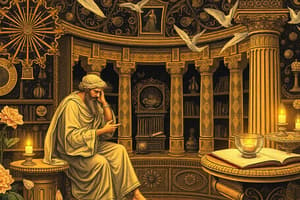Podcast
Questions and Answers
What principle did Thales propose as the origin of life and the Earth?
What principle did Thales propose as the origin of life and the Earth?
- Fire
- Air
- Earth
- Water (correct)
Why is the study of Greek philosophy considered relevant today?
Why is the study of Greek philosophy considered relevant today?
- It emphasizes religious dogma.
- It discourages rational inquiry.
- It promotes mythological thinking.
- It laid the foundation for scientific thinking. (correct)
What does Heraclitus's philosophy of 'panta rhei' emphasize?
What does Heraclitus's philosophy of 'panta rhei' emphasize?
- Everything is in a state of flux. (correct)
- Reality is an illusion.
- Knowledge can only be derived from sensory experience.
- Everything is constant and unchanging.
What did Socrates seek to demonstrate regarding the oracle's prophecy of him being the wisest man?
What did Socrates seek to demonstrate regarding the oracle's prophecy of him being the wisest man?
What are Zeno's paradoxes primarily designed to illustrate?
What are Zeno's paradoxes primarily designed to illustrate?
How did Thales's observation of water contribute to his cosmological doctrine?
How did Thales's observation of water contribute to his cosmological doctrine?
What type of philosophical ideas were represented by the 'aporias' attributed to Parmenides?
What type of philosophical ideas were represented by the 'aporias' attributed to Parmenides?
What aspect of life did the Ship of Theseus thought experiment primarily question?
What aspect of life did the Ship of Theseus thought experiment primarily question?
What is a characteristic that distinguishes mythical thinking from rational thinking?
What is a characteristic that distinguishes mythical thinking from rational thinking?
In which era did the earliest beginnings of philosophy emerge?
In which era did the earliest beginnings of philosophy emerge?
According to Aristotle, what initiates the process of philosophical thinking?
According to Aristotle, what initiates the process of philosophical thinking?
What type of knowledge is predominant in oral cultures compared to written cultures?
What type of knowledge is predominant in oral cultures compared to written cultures?
What does the term 'philosophy' literally translate to?
What does the term 'philosophy' literally translate to?
How does mythical thinking view time?
How does mythical thinking view time?
What is a primary focus of rational explanations?
What is a primary focus of rational explanations?
Which philosopher is noted for proposing that myths and magic are replaced by science and philosophy?
Which philosopher is noted for proposing that myths and magic are replaced by science and philosophy?
What characterizes philosophical problems in contrast to scientific problems?
What characterizes philosophical problems in contrast to scientific problems?
What does the term 'arche' refer to in philosophical context?
What does the term 'arche' refer to in philosophical context?
How did Thales contribute to the understanding of 'arche'?
How did Thales contribute to the understanding of 'arche'?
Which philosophical discipline is concerned with the nature of reality?
Which philosophical discipline is concerned with the nature of reality?
What distinguishes reductionism from other philosophical views?
What distinguishes reductionism from other philosophical views?
What is a major characteristic of the early philosophers known as cosmologists?
What is a major characteristic of the early philosophers known as cosmologists?
Which of these views is NOT considered a monistic perspective?
Which of these views is NOT considered a monistic perspective?
What fundamental question does epistemology seek to explore?
What fundamental question does epistemology seek to explore?
What is one purpose of asking 'why' questions during a discussion?
What is one purpose of asking 'why' questions during a discussion?
In the Socratic method, which step involves listening to the other person's argument?
In the Socratic method, which step involves listening to the other person's argument?
What is the goal of the 'Reflect' step in the Socratic questioning framework?
What is the goal of the 'Reflect' step in the Socratic questioning framework?
What can be useful in the 'Refine' step when confronting assumptions?
What can be useful in the 'Refine' step when confronting assumptions?
What should one do after refining their thinking in a discussion?
What should one do after refining their thinking in a discussion?
Which of the following is a benefit of using an iterative process in dialogue?
Which of the following is a benefit of using an iterative process in dialogue?
What type of question can often feel confrontational when challenging assumptions?
What type of question can often feel confrontational when challenging assumptions?
What should one do after receiving new viewpoints in the Socratic process?
What should one do after receiving new viewpoints in the Socratic process?
What was the primary aim of Socrates' inquiry?
What was the primary aim of Socrates' inquiry?
Why was Socrates perceived as a threat to some authorities?
Why was Socrates perceived as a threat to some authorities?
Which of the following accurately describes the consequences of Socrates’ teachings?
Which of the following accurately describes the consequences of Socrates’ teachings?
What did Socrates believe about the relationship between knowledge and living a virtuous life?
What did Socrates believe about the relationship between knowledge and living a virtuous life?
What were the main steps in the Socratic method?
What were the main steps in the Socratic method?
Which of the following best explains the 'Receive' step in the Socratic method?
Which of the following best explains the 'Receive' step in the Socratic method?
How did Socrates believe knowledge impacted one's quality of life?
How did Socrates believe knowledge impacted one's quality of life?
What accusations led to Socrates' death sentence by the Athenian court?
What accusations led to Socrates' death sentence by the Athenian court?
Flashcards
Mythical Thinking
Mythical Thinking
Thinking characterized by imagination, intuition, and emotion, where reasoning takes a backseat. It prioritizes the cyclical nature of time and emphasizes stories that explain the world through divine actions and a fall from a golden age.
Rational Explanation
Rational Explanation
A way of understanding the world based on logic, evidence, and reason. It emphasizes causality, objectivity, and the ability to be falsified or supported by evidence.
Philosophy
Philosophy
The love of wisdom, a pursuit of knowledge that seeks to understand the fundamental nature of reality, existence, and human experience.
Pre-Socratics
Pre-Socratics
Signup and view all the flashcards
Wonder
Wonder
Signup and view all the flashcards
Comprehensive View of Reality
Comprehensive View of Reality
Signup and view all the flashcards
Falsifiability
Falsifiability
Signup and view all the flashcards
Reasoning
Reasoning
Signup and view all the flashcards
What are philosophical problems?
What are philosophical problems?
Signup and view all the flashcards
What does metaphysics study?
What does metaphysics study?
Signup and view all the flashcards
What does epistemology study?
What does epistemology study?
Signup and view all the flashcards
What does logic study?
What does logic study?
Signup and view all the flashcards
What does ethics study?
What does ethics study?
Signup and view all the flashcards
What was the goal of early philosophers?
What was the goal of early philosophers?
Signup and view all the flashcards
What is 'arche'?
What is 'arche'?
Signup and view all the flashcards
What are reductionism, monism, and naturalism?
What are reductionism, monism, and naturalism?
Signup and view all the flashcards
Socratic Method
Socratic Method
Signup and view all the flashcards
Re-state
Re-state
Signup and view all the flashcards
Re-start
Re-start
Signup and view all the flashcards
Refine
Refine
Signup and view all the flashcards
Reflect
Reflect
Signup and view all the flashcards
Receive
Receive
Signup and view all the flashcards
Cognitive Fallacy
Cognitive Fallacy
Signup and view all the flashcards
Premise
Premise
Signup and view all the flashcards
Thales' Cosmological Doctrine
Thales' Cosmological Doctrine
Signup and view all the flashcards
Arche
Arche
Signup and view all the flashcards
Panta Rhei
Panta Rhei
Signup and view all the flashcards
The Ship of Theseus
The Ship of Theseus
Signup and view all the flashcards
Zeno's Aporias
Zeno's Aporias
Signup and view all the flashcards
Socrates' Search for Wisdom
Socrates' Search for Wisdom
Signup and view all the flashcards
Transition from Myth to Rationalism
Transition from Myth to Rationalism
Signup and view all the flashcards
Socrates' View on Knowledge
Socrates' View on Knowledge
Signup and view all the flashcards
Why was Socrates Sentenced to Death?
Why was Socrates Sentenced to Death?
Signup and view all the flashcards
Receive in Socratic Method
Receive in Socratic Method
Signup and view all the flashcards
Reflect in Socratic Method
Reflect in Socratic Method
Signup and view all the flashcards
Refine in Socratic Method
Refine in Socratic Method
Signup and view all the flashcards
Socrates' Goal of Inquiry
Socrates' Goal of Inquiry
Signup and view all the flashcards
Socrates' View on Quality of Life
Socrates' View on Quality of Life
Signup and view all the flashcards
Study Notes
Mythical Thinking
- Considered more primitive and irrational
- Emphasizes imagination, intuition, and emotion
- Time is cyclical and eternal, not linear
- Importance of oral traditions and memory
- Knowledge limited to remembered stories
- Explanation of events through divine intervention
Mythical vs. Rational Explanations
- Mythical: events primarily due to divine actions
- Rational: emphasizes causality, reason, and evidence
- Rational explanation focuses on logic and evidence.
- Mythical explanation relies on divine intervention.
Philosophy
- Derived from Greek words "philo" (love) and "sophia" (wisdom)
- Meaning: love of wisdom
- Origin: traced back to the 6th century BCE in ancient Greece
- Aristotle: philosophy arises from wonder/curiosity.
- Philosophy seeks a comprehensive view of reality.
Philosophical Problems
- General problems: about existence, knowledge, the mind, good, and fairness
- Different from religious problems: focus on universal principles rather than specific religious doctrines
- Different from scientific problems: seeks broader meaning rather than specific explanations about the natural world.
Studying That Suits You
Use AI to generate personalized quizzes and flashcards to suit your learning preferences.
